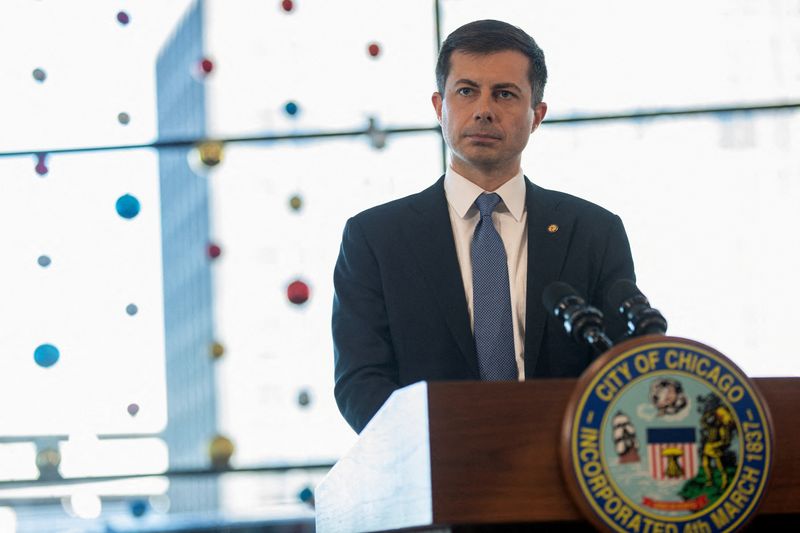U.S. awards $94 million for innovative mobility projects
2023.03.21 05:23

© Reuters. FILE PHOTO: U.S. Transportation Secretary Pete Buttigieg speaks ahead of expected Thanksgiving travel at O’Hare airport in Chicago, Illinois, U.S., November 21, 2022. REUTERS/Jim Vondruska
By David Shepardson
WASHINGTON (Reuters) – The U.S. Transportation Department will announce on Tuesday it is awarding $94.8 million to 59 projects on advanced technology projects to boost road safety, improve transit reliability and use drones and sensors for transportation projects.
The $1 trillion November 2021 infrastructure law dedicates $500 million over five years for “Smart” mobility projects.
U.S. Transportation Secretary Pete Buttigieg said the grants would “foster innovations that improve people’s day-to-day lives, making transportation safer, more reliable, more efficient, and more sustainable.”
Detroit is getting $2 million for sensors to create smart intersections by using existing traffic cameras to deploy artificial intelligence software solutions to “predict and prevent traffic accidents” in the city, Michigan’s largest.
Traffic deaths jumped 10.5% to 42,915 in 2021, the highest number killed on American roads since 2005. After declining for years, traffic deaths jumped sharply after COVID-19 lockdowns expired in 2020 and more drivers engaged in unsafe behavior.
New Jersey has won $2 million for sensors to address wrong-way driving events while New York is receiving $2 million for an app to allow visually impaired New York subway and bus customers to safely navigate their transit trips.
Los Angeles is receiving $2 million to integrate transit trip planning with event ticketing for major activities, including the 2028 Olympic and Paralympic Games
Cleveland, Ohio will get $1.8 million for smart traffic signals to provide the right of way to emergency vehicles, and Harris County, Texas is receiving $2 million for sensors for a new flood warning system.
Three tribal nations in North Dakota are receiving $2 million for drone technology for medical care and equipment deliveries, while a project to use drones to deliver medical supplies in Virginia’s Eastern Shore will get $1.9 million.
Massachusetts is receiving $2 million to use drones and sensors to monitor and analyze railroad infrastructure threatened by ground water variability while New York will use $1.5 million for drones to inspect infrastructure along a major highway.
Many projects relate to “connected vehicle” technology to avoid crashes by using cellular transmissions.








